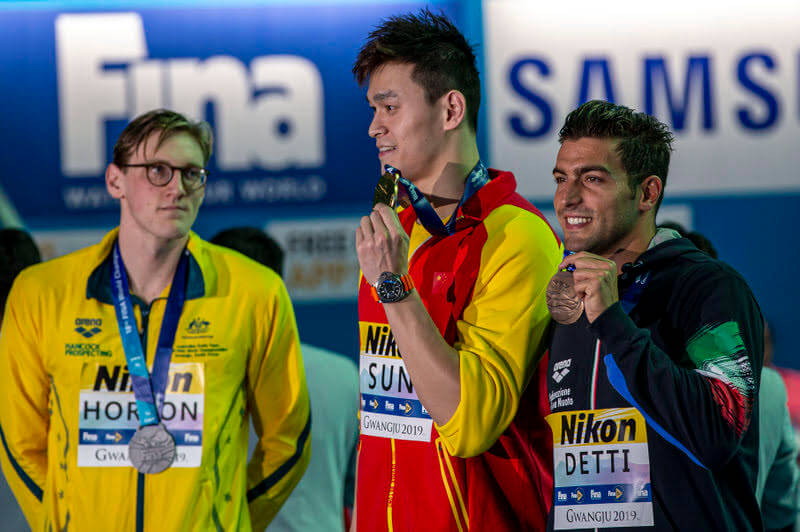Column: Olympic Titlist Mack Horton Was Also a Champion With His Voice and Courage to Oppose Doping

Column: Olympic Titlist Mack Horton Was Also a Champion With His Voice and Courage to Oppose Doping
One gold medal from the career of Mack Horton will always be tangible. The Australian distance ace will forever have memories from the title awarded him for his performance in the 400-meter freestyle at the 2016 Olympic Games in Rio de Janeiro. In South America, an effort of 3:41.55 elevated Horton into Aussie sporting lore.
Horton announced over the weekend that his competitive career will cease, the desire no longer burning for a run at the 2024 Olympic Games in Paris. And so, the timing is right to celebrate what Horton achieved in the pool, specifically his legacy as an Olympic champion and multi-time medalist at the World Championships and Commonwealth Games.
Distance swimming, particularly, has a rich tradition in the Land Down Under, and throughout his career, Horton upheld what his predecessors achieved. As an Olympic champ in the 400 freestyle, the 27-year-old stands alongside the likes of Murray Rose and Ian Thorpe. Sure, his talent was extraordinary. Anyone capable of capturing Olympic glory must possess a skill set known to a miniscule percentage of athletes. Horton, too, was a grinder, an athlete who battled to the wall and stood up in relay duty for his country.
“As an athlete leader, he respected those that came before him and those that came after him… and his perspective was invaluable not just to his teammates but to us as coaches,” said Australian head coach Rohan Taylor. “He was a world-class competitor, and a person with a high level of integrity. I know he is content with this decision, and he will be enormously successful in the next stage of his life.”
Leader. That word selected by Taylor to describe Horton could not be more fitting. Yet, Horton emerged as more than a leader for Australia. He took on the role for all of his fellow athletes in the sport. And it was this status, first on full view at the 2016 Olympics, which allows Horton to be deemed a gold medalist – in an intangible manner – for his courage and willingness to protect his sport.
Heading into the Rio Games, the impending duel between Horton and China’s Sun Yang in the 400 freestyle figured to be epic. Anticipation for the matchup only grew when Horton called Sun a “drug cheat” during a pre-competition interview. The label chosen by the Aussie hinged on Sun’s under-the-radar doping suspension, which was not revealed by Chinese officials until it was already served.
Rather than sit back, Horton opted to address an issue which has long been a controversial topic in the sport. He didn’t like how Sun’s violation was seemingly brushed aside, so he brought the subject to the forefront – at the risk of being vilified for his stance and at the risk of distracting himself from his target – capturing Olympic gold.
But Horton acted how he thought was appropriate. An athlete who tested positive for a banned substance should not have been present at the Games, and Horton had an opportunity to call Sun out. It was a call for clean sport and placed Horton alongside American Shirley Babashoff, who used her voice in the 1970s to call out the obvious doping program operating in East Germany.
Once the 400 freestyle unfolded in Rio, it was Horton who emerged victorious over Sun, a mere .13 separating the athletes at the finish. Three years later, after Sun defeated him in the 400 freestyle at the World Championships in Gwangju, Horton continued his protest. He declined to shake Sun’s hand and would not share the podium with his foe. Eventually, Sun was levied a second suspension for a doping violation, this one likely keeping him out of the Paris Games.
While Horton took some arrows for his position and decisions, his actions were loyal to his beliefs. He was a man who wanted a sport which was free of doping and offered a level playing field. He spoke for athletes who raced against dopers before him. He spoke for those who would follow. Simply, Mack Horton put his sport first.
“I have felt so privileged to represent Australia and wear the green and gold … I just hope Australia thinks I did them proud,” he said in his retirement announcement. “I am so grateful for my time in swimming and in regard to legacy, I hope my teammates and the sport think that I was able to help them and the sport in some way.”
Indeed, he did.
In the pool, and with his voice.



